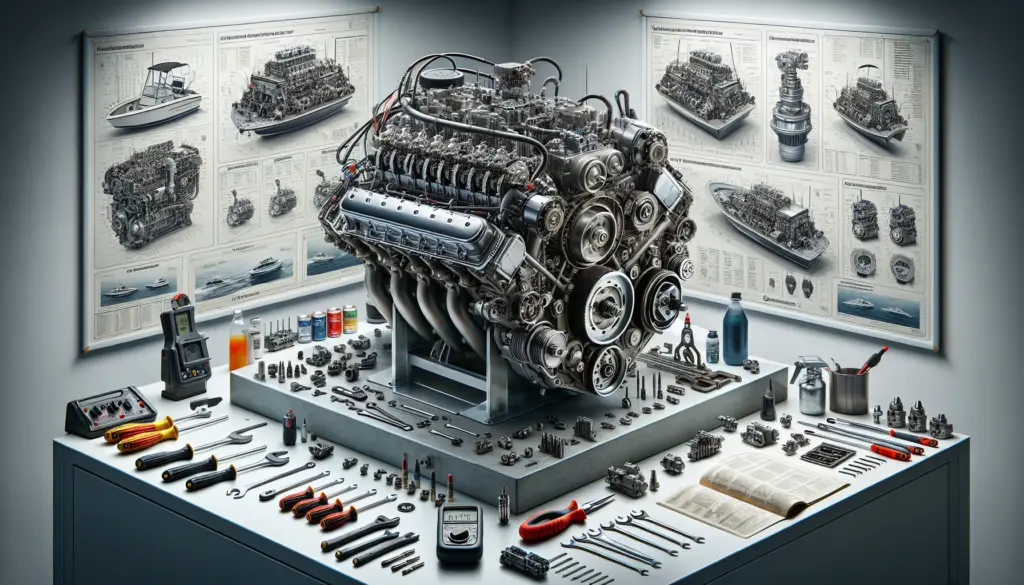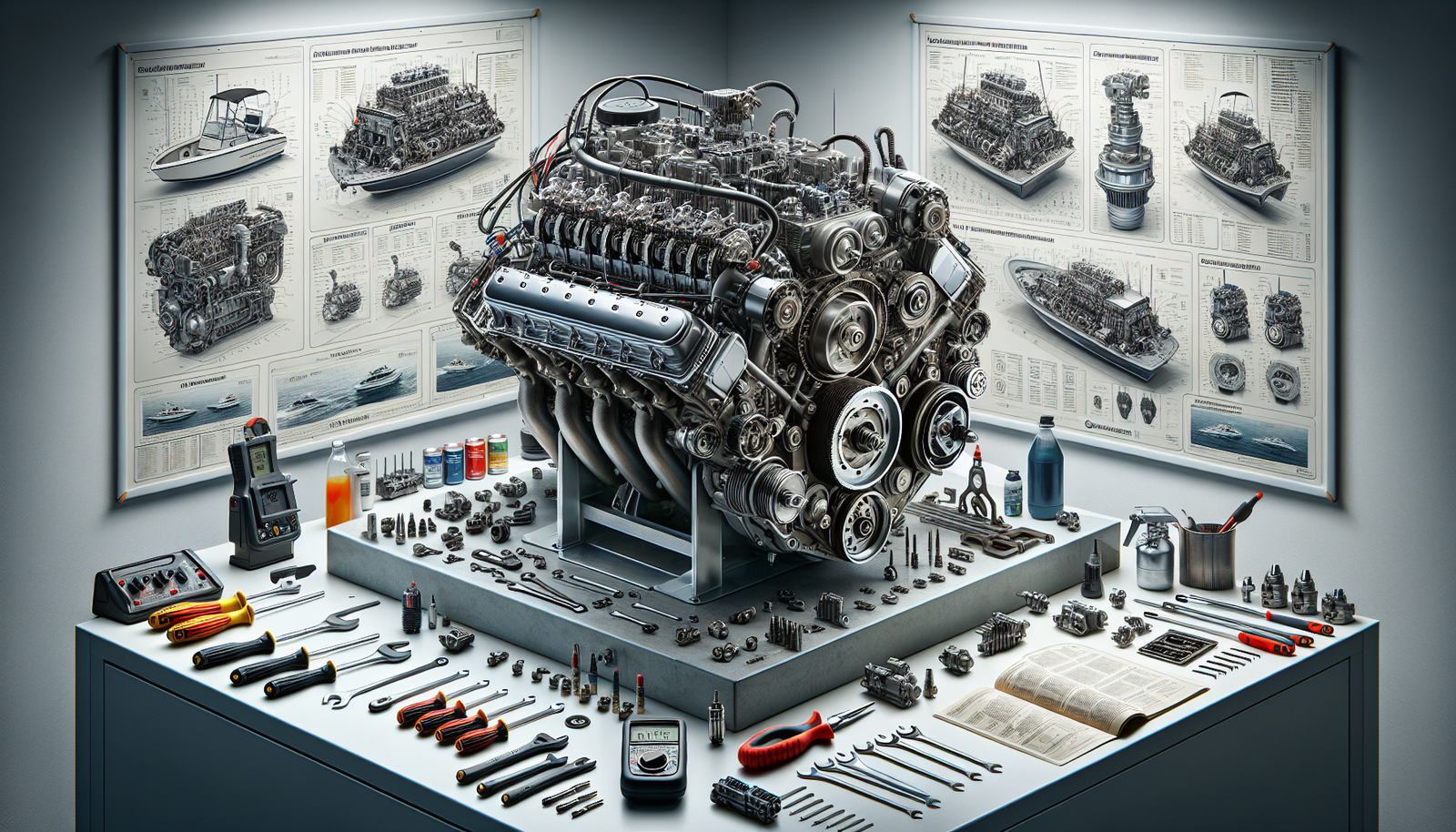Are you eager to amplify your boat’s performance? In the article titled “Expert Advice on Upgrading Your Boat Engine for Better Performance”, professional experience and profound knowledge about boat enhancements will be shared to help you take your boat’s engine from suffice to superb. Prepare to gain insights into the ins-and-outs of boat engine upgrades – from understanding which type of engine is most suitable for your boat to the most efficient ways to maintain it. Don’t miss out on these expert tips and tactics for elevating your boating experience.
Understanding Your Boat Engine Needs
Just like when deciding to upgrade any object you own that’s vital to your daily life, a boat engine requires careful consideration. Believe it or not, simply deciding to replace your boat engine because you fancy a new one may not be the best move. The first thing you should do is thoroughly consider the current state of your boat’s engine.
Assessing the current engine performance
Begin the process by thoroughly evaluating the current performance levels of your boat engine. You need to take a good look at its fuel consumption, its horsepower capability and how well it performs in all the different sailing conditions you usually find yourself in. Try and identify any unusual engine behavior and pinpoint any persisting problems you’ve already noticed.
Identifying your individual boating needs
Your personal outings on the sea, lake or river may all require different boat engine capabilities. If you’re an adrenaline junkie with a need for speed, looking into upgrading your engine for more power would be a great idea. Alternatively, if you’re mostly using your boat for leisure, making sure your engine upgrade enhances fuel efficiency and reduces noise may be more suitable.
Determining the necessary upgrades
Now that you’ve clarified the current engine performance and your individual boating needs, it should be easier to identify the necessary improvements for your boat engine. Be sure to prioritize these engine upgrades based on importance and then you can start working on enhancing performance.
Examining Your Boat Engine
A basic understanding of how your boat engine operates can offer a more nuanced perspective to your considerations for an upgrade. Let’s dive into how you can examine your boat engine effectively.
Understanding boat engine mechanics
Sharpen up your knowledge in engine mechanics. Not every boater needs to be a certified mechanic, but knowing what to look for when it comes to your marine engine is an ideal first step. An engine, fundamentally, is a mixture of moving parts that work in harmony with each other to move your boat. This is why a ripple effect happens when one part goes bad – it affects the rest.
Conducting a thorough engine examination
Start with a visual inspection, and then move on to a more detailed analysis of different components. Measure the oil level, inspect for leaks, examine the belts for damages, check the air and fuel filters, and look for any loose connections. A flaw, even minor, can speak volumes about the condition and the need for repair or replacement of your boat engine.
Monitoring key performance indicators of your boat engine
It’s essential to keep track of your boat engine’s Key Performance Indicators (KPIs) which can include engine speed, fuel consumption, oil pressure, engine temperature, exhaust temperature, among others. Regular monitoring of these indicators will give you an idea about whether the outputs are within the acceptable range.
Type of Boat Engines
Before choosing a new engine for your boat, it behooves you to familiarize yourself with different types of boat engines that are available in the market.
Outboard motors
Outboard motors are a popular choice for many boat owners due to their ease of installation, maintenance, and the possibility for tilt and trim. The engine, your steering mechanism, and propulsion unit are all in one single construction outside of the boat, providing you with practical benefits like more cabin space.
Inboard motors
Inboard engines are usually found on larger boats. These engines, located inside the boat, are more powerful and quieter than outboards. They provide a balanced center of gravity for the boat while being more concealed and secure.
Diesel engines
Favorable for their durability and high-torque attributes, diesel boat engines are a terrific option for cruising at lower speeds. They are also known to be more fuel-efficient and safer due to their non-explosive nature.
Gas engines
Gas engines, on the other hand, give you higher speed, which can be a lot more fun. They are generally less expensive than diesel engines and slightly easier to maintain due to global universal parts availability.

Selecting The Right Engine For Upgrade
Selecting the boat engine that aligns with your personality and needs can be an exciting process, especially with the variety in high-quality engines available in the market.
Aligning the engine with your needs
You’ve already analyzed your boating needs in the previous steps. The trick here is to find an engine that not only meets your specific requirements but ideally, enhances your boating experience as well.
Comparing different engine manufacturers
Do your research. Compare different boat engine manufacturers and identify which ones are trusted for their high-quality products, durability, efficient fuel consumption and excellent after-sales service.
Considering the engine’s power & fuel efficiency
Your new engine’s horsepower is probably going to influence your choice significantly. A larger horsepower correlates to faster speeds, though it’s important to recognize that not all boats are designed to handle high levels of horsepower. Similarly, fuel efficiency is a crucial factor. An engine with high fuel efficiency will not only save you from constantly refilling the tank, but it’s also environmentally friendly!
Performance Enhancing Boat Engine Upgrades
There’s more to an engine upgrade than simply getting a bigger, more powerful model. In many cases, you can get the most out of your current engine thanks to some targeted tweaks and additions.
Upgrading the carburetor or fuel injector
Most outboard motors rely on carburetors to combine air and fuel, but these can be replaced with fuel injectors for a substantial performance boost. Fuel injectors are more modern and efficient, mixing fuel and air more accurately and effectively than carburetors.
Improving engine cooling systems
Improved cooling systems can greatly enhance your engine’s performance. Overheating can cause havoc on boat engines, leading to decreased effectiveness, component wear, and even total engine failure.
Advantages of replacing exhaust system
Replacing the exhaust system of your motorboat can have several benefits such as improved fuel efficiency, increased engine power, and reduced engine noise.
Increasing horsepower with engine tuning
Through proper tuning, you can sometimes squeeze a bit more horsepower out of your boat engine. Tuning involves adjusting the engine for optimal performance, and in some cases, it can provide a noticeable increase in power output.
Employing Modern Technology for Better Performance
There are countless ways that modern technology can aid in the performance of your boat. Let’s chat about a few upgrades that could significantly improve your boat’s engine.
Utilizing engine control units
The Engine Control Unit is the brains behind your engine’s function and controls everything from fuel mix to ignition timing. Upgrading your ECU can result in better performance and efficiency.
Incorporating turbochargers or superchargers
If you’re after more power and speed, consider incorporating turbochargers or superchargers into your engine. They work by forcing more air into the engine’s combustion chamber, allowing more fuel to be used, which results in increased engine output.
Remote monitoring systems
Make use of the convenience offered by technology and keep a check on your boat engine’s vitals from your handheld device through remote monitoring systems. Such systems allow you to observe engine performance indicators in real-time and alert you of any abnormalities, thus promising a long life for your engine.
Hiring Professionals For Engine Upgrades
Unless you’re an experienced engineer, you’ll likely need the help of a professional when it comes to upgrading or replacing your boat engine.
Finding a reliable boat engineer
Find a reputable marine mechanic who can ensure the upgrade process goes smoothly. Look for someone with an extensive history and positive reviews for boat engine work.
Understanding the process of professional engine replacement
Understanding the process and the time it takes to replace or upgrade an engine will help you plan your boating activities. With professional help, it can typically take anywhere from a few days to a few weeks, depending on the complexities involved.
Costs involved with professional engine repairs
Lastly, but importantly, account for the costs involved in hiring professionals for engine repair, replacement or upgrade. Though they’re an additional expense, they are an investment towards high-quality workmanship, professional guidance, and peace of mind.
Maintenance Tips Post-Upgrade
After an upgrade, your engine is more powerful and is likely equipped with modern techniques and upgrades. To ensure these improvements last, proper maintenance is key.
Routine maintenance checks
Make routine maintenance a priority. This includes oil changes, checking fuel systems, cleaning and inspecting essential output factors.
Keeping the engine clean
A clean engine is not only visually appealing but also performs better. Be sure to keep it free of dirt, grime, or anything that can clog or damage its parts.
Deal with repairs promptly
Despite regular checks and cleaning, if there are any issues that arise, attend to them promptly. Regular repair can ensure your engine’s longevity and can prevent minor issues from turning into significant problems.
Safety Considerations When Upgrading Your Boat Engine
A more powerful engine means you’ll need to upscale your safety measures too.
Ensuring engine upgrades meet safety standards
Ensure that your newly upgraded engine meets all the safety standards prescribed by marine regulatory bodies and manufacturers.
Safety equipment to keep on board
Regardless of the type or size of your boat, make sure you always have essential safety equipment on board, including life jackets, distress signals, fire extinguishers, and a basic first aid kit.
Regular safety inspections post-upgrade
A newly installed engine warrants regular safety inspections, particularly during the initial period after the upgrade.
Evaluating Upgrade Success
Evaluating the success of your upgrade assures you that your investment has paid off satisfactorily.
Assessing new engine performance
Is your new engine performing up to your expectations? Make sure it meets or surpasses the predetermined set of goals you had before the upgrade.
Monitoring fuel consumption and efficiency
Keeping an eye on fuel usage is a great way to see if your new engine is more efficient than the old one.
Enjoying increased speed or power on water
Ultimately, you should be able to feel the upgrade. Whether it’s in the form of increased speed, more power, or simply an easier and smoother ride, a successful upgrade should be tangible and worth every penny and effort you’ve invested.


